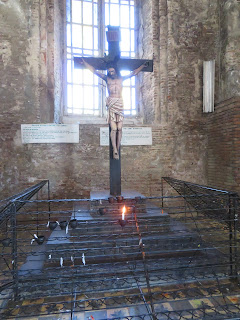psalm 47: the lord mounts his throne - ascension
 I would like to continue my reflection
on the responsorial psalm of the mass and today we reflect on Psalm 47. Psalm 47 is an appropriate psalm for the
feast which we celebrate today, the solemnity of the Ascension when Christ our
Lord after completing his mission here on earth went up to heaven and now sits
at the right hand of the Father. Psalm 47 however situated in the context of
the Ascension is not just your ordinary description of going up. In so
many words the psalm wants us to visualize the majesty, the splendor of the
King's ascending which only the likes of Franco Zifferelli can produce on stage
and Cecil DeMille on film. There is
grandeur in the description, there is an emphasis on the splendor of the ascension
– "the Lord God mounts his throne and he mounts it amidst trumpet blasts,
and as he ascends his throne all people clap their hands, there are shouts of
joy, there are cries of gladness, for the Lord is the most high, he is the
great king, reigning over the nations, sitting upon his holy throne." This is not just moving up, it is moving to
the highest up. The king is not just on high
but he is the most high, God is not just superior, or greater or grander, no,
God is supreme, God is the greatest, God is the grandest - God outstrips all
rulers, kings and princes, for God is above everything and everyone.
I would like to continue my reflection
on the responsorial psalm of the mass and today we reflect on Psalm 47. Psalm 47 is an appropriate psalm for the
feast which we celebrate today, the solemnity of the Ascension when Christ our
Lord after completing his mission here on earth went up to heaven and now sits
at the right hand of the Father. Psalm 47 however situated in the context of
the Ascension is not just your ordinary description of going up. In so
many words the psalm wants us to visualize the majesty, the splendor of the
King's ascending which only the likes of Franco Zifferelli can produce on stage
and Cecil DeMille on film. There is
grandeur in the description, there is an emphasis on the splendor of the ascension
– "the Lord God mounts his throne and he mounts it amidst trumpet blasts,
and as he ascends his throne all people clap their hands, there are shouts of
joy, there are cries of gladness, for the Lord is the most high, he is the
great king, reigning over the nations, sitting upon his holy throne." This is not just moving up, it is moving to
the highest up. The king is not just on high
but he is the most high, God is not just superior, or greater or grander, no,
God is supreme, God is the greatest, God is the grandest - God outstrips all
rulers, kings and princes, for God is above everything and everyone.
The psalm therefore wants us to see a
reality in our faith which we sometimes forget.
In our effort to level the playing
field, a laudable effort indeed, the psalm reminds us that there still remains
a positional difference among us – a parent to their children, an elder to the
younger, a teacher to her students, a bishop to his priests. Thus, rightly
obedience, humility, docility on the willingness to be taught and guided, and
even humble submission are virtues we need to live by. There remains a positional difference among
us and this is not just a call to recognize but to respect and embrace.
In our effort to democratize everything,
the psalm again reminds us that there is a king, there is someone supreme,
there is God Most High. The truth, what is right and wrong, what is good and
evil are not determined by the opinion of the majority. Truth cannot be relative to the opinions of
people, for it is true regardless of; right is always right even if no one is
doing it or even if the majority is acting contrary to it; evil is always evil
even though how much one tries to justify it – lying is lying, stealing is stealing,
killing is killing.
We need to recover that part in our
faith when we say God is most high. Yes
Jesus is a friend; yes Jesus understands; yes Jesus is somebody so near, so
loving, so merciful, so kind. But he is
also God Most High. And in the
majestic tone of our second reading Paul describes Jesus to the Ephesians saying
that the Father has seated him "at
his right hand in the heavens, far above
every principality, authority, power, and dominion, and every name that is named not only in this age but also in the one to come.
And he put all things beneath his feet and gave him as head over all things to the church." These words might be too archaic to our
hearing today but I think it would help if I interpret this using the words of
Pope Benedict XVI and applying them liberally to this passage - Jesus loves us yes, and like a loving parent
that he is, "he wants us to grow in the truth and rightly he makes demands
on us and must also correct us."
In this feast of the ascension when
Jesus ascended to heaven and sits on the throne on the right hand of the
Father, let us recover this one aspect of our relationship with God and with
each other.
Comments